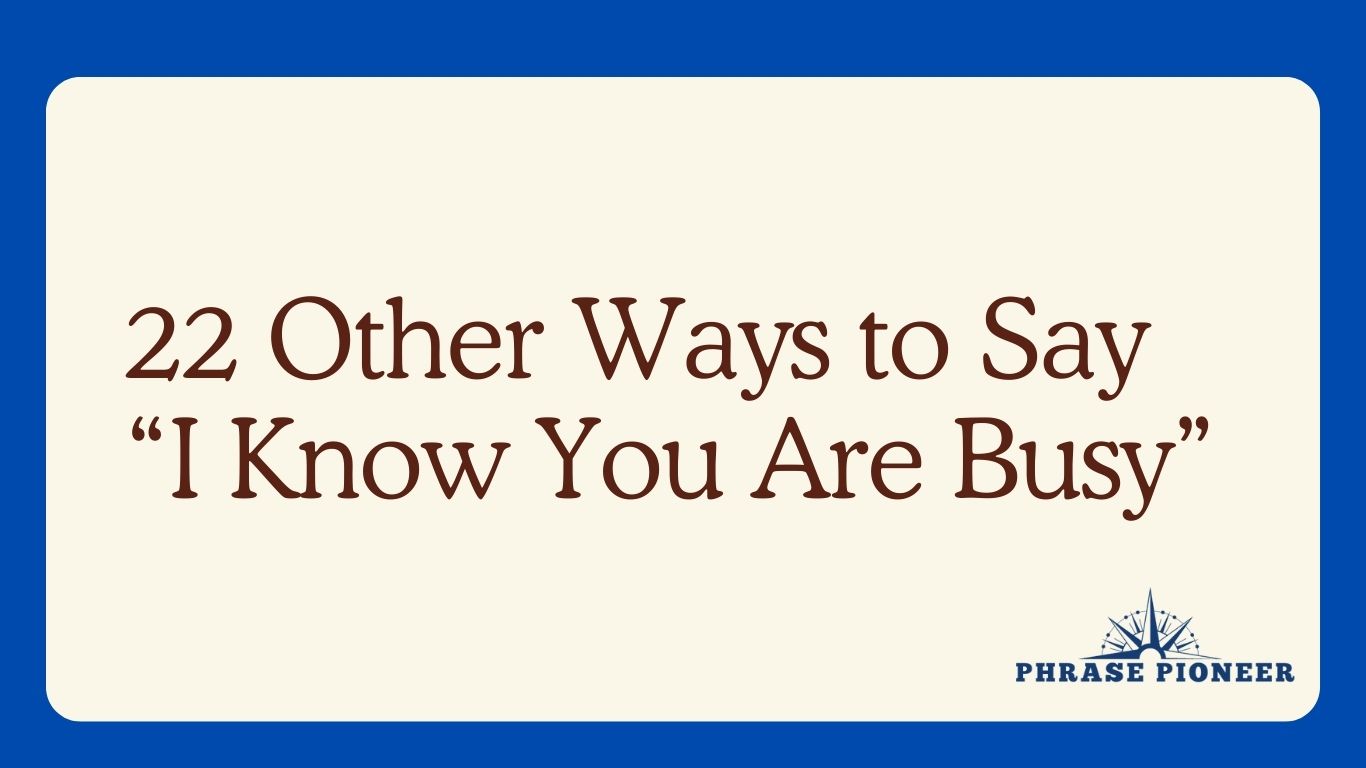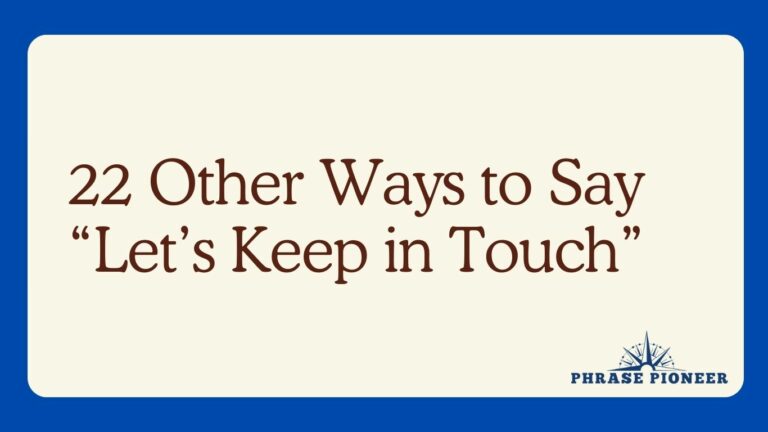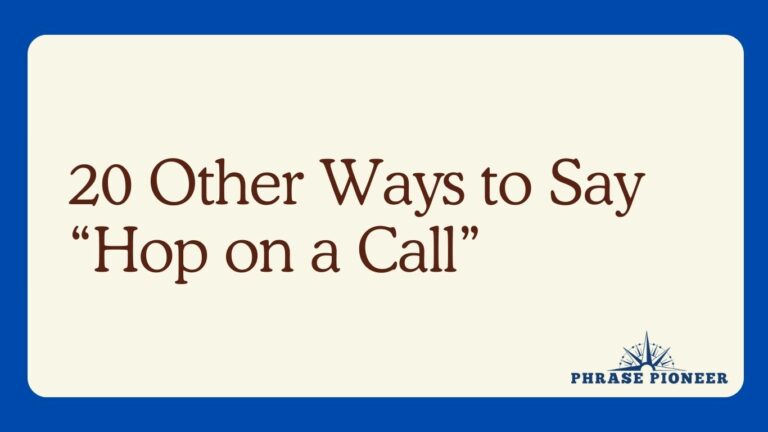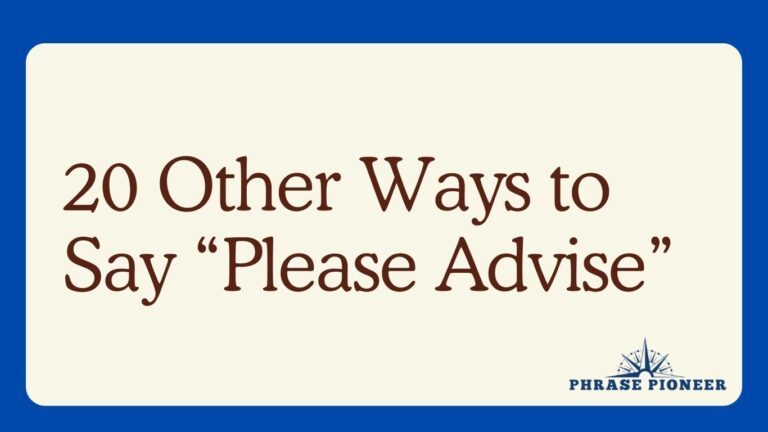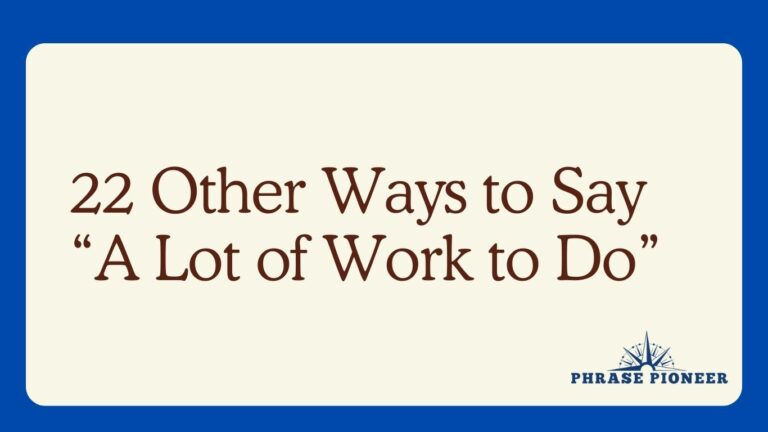22 Other Ways to Say “I Know You Are Busy”
Acknowledging someone’s tight schedule is a courteous way to preface a conversation or a request.
The phrase “I Know You Are Busy” conveys understanding and respect for the person’s time.
Here are 22 alternative expressions that offer a variety of ways to show this acknowledgment, suitable for different contexts and levels of formality.
Formal and Considerate Acknowledgments
- I realize your schedule is quite full
- Example: I realize your schedule is quite full, but I am seeking a brief moment to discuss a time-sensitive matter.
- Explanation: A very polite and professional way to acknowledge someone’s busy agenda while asking for their time.
- I understand that your time is valuable
- Example: I understand that your time is valuable, hence my request for a focused conversation.
- Explanation: Shows respect for the person’s time and implies that you won’t waste it.
- I appreciate that you have a tight schedule
- Example: I appreciate that you have a tight schedule, and I’m grateful for any time you can spare.
- Explanation: This expresses gratitude in advance for the person’s willingness to fit you into their busy timetable.
Direct and Unassuming
- I’m aware you have a lot on your plate
- Example: I’m aware you have a lot on your plate, so let’s get straight to the point.
- Explanation: Uses a common idiom to convey understanding and suggests a no-nonsense approach to the conversation.
- I recognize you’re swamped
- Example: I recognize you’re swamped, so I’ll make this quick.
- Explanation: An informal acknowledgment of someone’s workload, with a promise to be brief.
- Knowing how packed your schedule is
- Example: Knowing how packed your schedule is, I’ve condensed my points into a brief summary for you.
- Explanation: Demonstrates consideration by proactively adjusting to the constraints of the other person’s time.
Gentle and Tactful Approaches
- Given your demanding agenda
- Example: Given your demanding agenda, when would be a convenient time to discuss our new initiative?
- Explanation: A tactful method of acknowledging their busyness while asking for a meeting.
- I’m conscious of your busy workload
- Example: I’m conscious of your busy workload, so if there’s anything I can do to assist, please let me know.
- Explanation: Indicates sensitivity to their workload and offers help.
- I respect your time is currently stretched
- Example: I respect your time is currently stretched, so I’ll be as efficient as possible.
- Explanation: This statement respects the individual’s time constraints and reassures them that you’ll be considerate.
Casual and Informal Recognition
- I get that you’re slammed
- Example: I get that you’re slammed, so thanks for squeezing in this meeting.
- Explanation: A casual way of showing understanding, frequently used among colleagues or friends.
- You must be up to your ears in work
- Example: You must be up to your ears in work, so I appreciate you taking the time.
- Explanation: A colloquial expression that recognizes the extent of the person’s busyness.
- You’re juggling a lot right now
- Example: You’re juggling a lot right now, aren’t you? Let’s keep this briefing short and sweet.
- Explanation: An informal and empathetic recognition of someone’s workload.
With a Sense of Urgency
- Acknowledging your existing commitments
- Example: Acknowledging your existing commitments, could we prioritize a moment to talk today?
- Explanation: Suggests that despite their busyness, the matter at hand is urgent enough to require immediate attention.
- Mindful of the demands on your time
- Example: Mindful of the demands on your time, I hope we could quickly touch base on a pressing issue.
- Explanation: Expresses awareness of their commitments and suggests a short meeting.
- With your calendar being so full
- Example: With your calendar being so full, I’m hoping to find a slot for a short consultation.
- Explanation: Indicates a recognition of their busy schedule and a request to find time for a meeting.
Polite and Encouraging
- In light of your busy agenda
- Example: In light of your busy agenda, any feedback you can provide will be highly valued.
- Explanation: A courteous way of asking for input despite their busy schedule.
- Considering the number of responsibilities you’re managing
- Example: Considering the number of responsibilities you’re managing, your expertise on this would still be incredibly insightful.
- Explanation: Highlights the person’s responsibilities while valuing their input.
- With the breadth of tasks before you
- Example: With the breadth of tasks before you, I’m especially thankful for any guidance you can offer.
- Explanation: Demonstrates an understanding of their large scope of work and shows appreciation for their assistance.
Straightforward and Respectful
- Being mindful that you’re inundated
- Example: Being mindful that you’re inundated, I’ll be sure to stay on topic in our discussion.
- Explanation: A straightforward acknowledgement of their heavy workload, with a commitment to stay focused.
- I am sensitive to your full agenda
- Example: I am sensitive to your full agenda and will not take more of your time than necessary.
- Explanation: Conveys respect for their time by assuring that your interaction will be concise.
- Fully aware of your extensive commitments
- Example: Fully aware of your extensive commitments, a quick sign-off on this document would be greatly appreciated.
- Explanation: Acknowledges their heavy workload and requests a prompt but necessary task.
- Given your considerable obligations
- Example: Given your considerable obligations, I’ll await your earliest convenience for a response.
- Explanation: Shows understanding for their multiple obligations and indicates a willingness to wait patiently for their reply.
These alternatives provide a nuanced way to show consideration for the busy schedule of others while still communicating your needs or requests.
They offer you the flexibility to match your expression of understanding with the appropriate context and relationship you have with the person.

